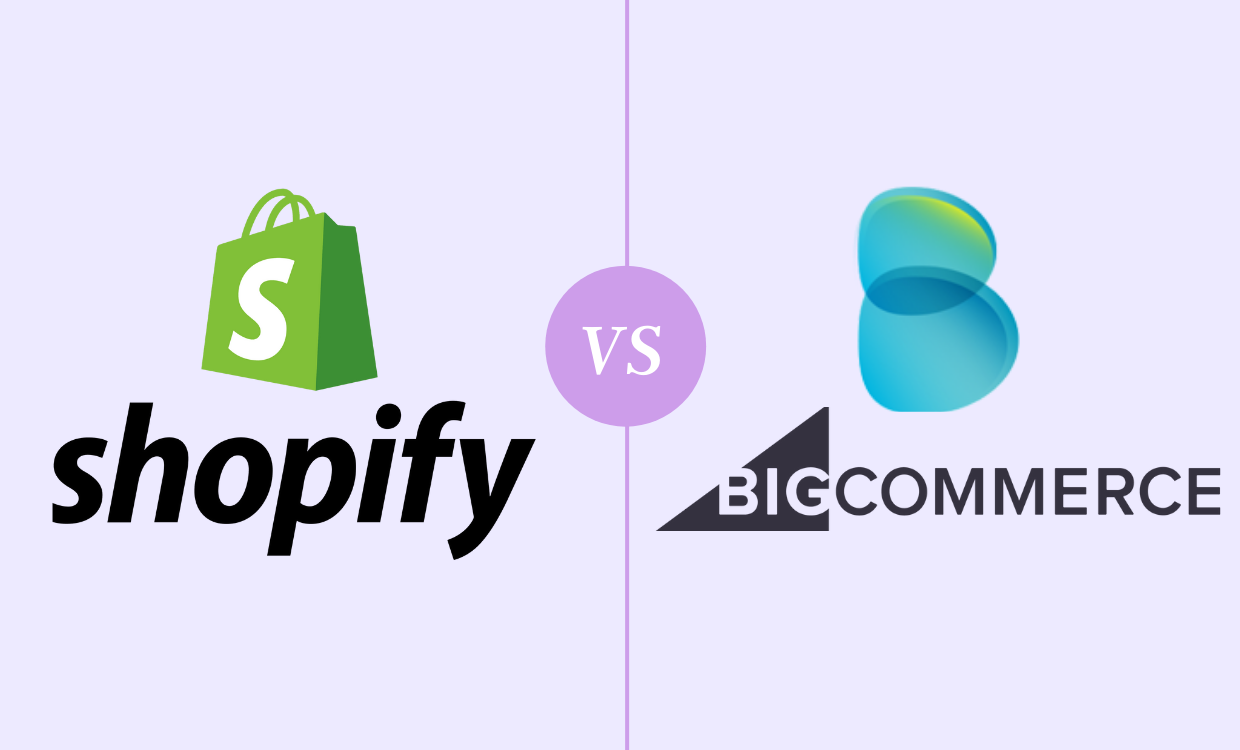Shopify and Bigcommerce both are the leading platforms for e-commerce businesses. But which one is best between them?
Both the e-commerce service providers allow users to sell their digital and physical products. No software installation is required to operate them, they run on a web browser.
Both platforms provide paid services so comparing them is necessary to find out the best service provider for your business.

Here is a detailed comparison between them that you should consider while investing in them.
1. Pricing & Plans
The pricing & Plans of website builder is a very important factor because it is directly linked to the project budget. Some plans include additional costs while some leave them out, the same applies to these e-commerce giants.
Monthly plans
Both have monthly basic plans but their pricing differs. Shopify 3 monthly plans are listed here:
- Basic Plan– $29
- Medium Plan– $79
- Advanced Plan– $299
Shopify also provides a lite plan which costs $9/month. But the lite plan simply offers an integration button to an existing website. It doesn’t offer an actual store or website.
It also has a ‘Shopify Plus’ plan, a more tailored solution for big enterprises and companies.
Bigcommerce also has monthly plans. They are listed here:
- Basic Plan- $29.95
- Medium Plan- $79.95
- Advanced Plan- $299.95
It also provides a well-tailored plan known as BigCommerce Enterprise for big e-commerce businesses.
Transaction Fees
Shopify charges a fee between 2%-0.5%, depending on the plan that you have selected. But you can avoid these charges by using ‘Shopify Payments as the payment method instead of any third-party like PayPal.
Bigcommerce pricing & transaction methods do not have any transaction fee.
Credit Card Fees
Credit card fees are paid to the third-party payment processor. The fees differ for different payment processors. Both platforms have tons of payment processors. Bigcommerce offers over 65 integrations while it’s competitor has around a hundred integrations.
PayPal is the most recommended payment processor for both platforms. It charges around 2.9% + 30¢ per transaction.
2. Ease to use
An e-commerce website should be easy to use and manage. The e-commerce website of both platforms is easy to handle. They have a simple content management system and a modern dashboard. Both have drag-and-drop builders but hand-on editing is not possible in Shopify without a freelance Shopify developer.
They are ideal for dropshipping. Shopify is more preferred by beginners due to its easy-to-use features.
If you have used WordPress and Squarespace then handling these platforms won’t be an issue due to uncanny similarities.
Concluding all Reddit answers and technical surveys it can be said that Bigcommerce has more sales features and is a more powerful e-commerce platform.
3. Templates
Bigcommerce themes have 12 free and over 150 paid themes that need one-time payment ( ranging between $150 – $300). You can browse a theme depending on your industry, layout, catalog size, and many more.
Shopify has over 9 free themes and over 70 paid themes (ranging between $100 -$180). You can select a theme as per your need and choice.
Both offer responsive templates which change layouts in devices to give the best result to the viewers. But customization in the template on both platforms is possible with the help of a freelance web developer only.
4. Sales features
The essential sales features like Basic shipping tools, An SSL certificate, Multichannel selling are present for both Shopify and Bigcommerce products.
What sets them apart is the inbuilt features. Bigcommerce has strong inbuilt sales features but in Shopify, you need additional applications to serve the purpose. Some extraordinary features of Bigcommerce are:
- Ratings and reviews
- Unlimited staff accounts
- Real-time shipping status (directly from third party carriers)
Bigcommerce also has a partnership with Walmart which means its users can sell products on Walmart too.
5. Blogging & Email features
Blogging is a powerful tool when used more properly and can drive a lot of traffic to a website. If you are working on a selected niche in a website then blogging can be a great asset for you.
Both Bigcommerce vs Shopify have a convenient method for blogging. But Yoast SEO feature is missing on both of them. Bigcommerce also lacks RSS feeds which are used to syndicate content and automatically generate email newsletters.
Complex blogging can be done on them using third-party blog integration such as WordPress. Built-in email forwarding is also convenient on both e-commerce platforms. Google Workspace or Microsoft 365 can be used on both of them to manage emails.
6. App stores & add-ons
Shopify and Bigcommerce app stores are available to integrate additional features or other web applications in the store.
More than 1,000 BigCommerce apps are available. But its rival is leading here with 6,000+ Shopify applications. The huge difference is because of the vast and diverse user base.
Due to a conflict with Mailchimp integration is only available on BigCommerce apps now. But Shopify has some leading email marketing platforms for integration like GetResponse, Campaign Monitor, and AWeber.
7. Support & security
Doesn’t matter If you have chosen Bigcommerce or Shopify you will get the following benefit:
- 24/7 phone support
- 24/7 live chat support
- Community forum
- Help center
- Video tutorials
- Email support
When it comes to security both offer free SSL. They also provide PCI DSS compliance. In BigCommerce you can upgrade your SSL certificate also.
Bigcommerce e-commerce platform is preferable for big businesses which have a large budget and a strong technical team to handle everything. It is a convenient platform for a decent size business also.
You can migrate easily from Bigcommerce to Shopify and vice versa. You can also integrate these platforms using app stores which are available for both e-commerce service providers.
. Meta: Bigcommerce vs Shopify differs in Pricing & Plans, Support & security, App stores & add-ons, Templates & customization, and other important features.